“I will be a unifying factor of politics and citizens, a representative of all citizens of our sovereign country, citizens of all ethnicities, religious backgrounds, of any race and sex.” Kosovo’s president, Hashim Thaçi, proclaimed these words as part of his speech to the Kosovo Assembly two years ago today, the day he was sworn in as head of state.
He had been elected by deputies on a tumultuous day a little over a month earlier back in February 2016, securing a simple majority of votes in the third round of voting, after failing to reach the two-thirds majority that is required in the first two rounds.
Outside of the Assembly building, hundreds of protesters — mobilized by the then “united opposition” of Vetëvendosje, the Alliance for the Future of Kosovo (AAK) and the Initiative for Kosovo (NISMA) — angrily chanted “with thieves, with thieves, there is no state”; a handful threw stones and molotov cocktails, before being dispersed by police using water cannon and tear gas. A peaceful protest camp of tents that had been established in Skanderbeg Square outside the Assembly building in the days before the vote was cleared by police in the process.
Inside the Assembly chamber, the three opposition parties continued their unusual protest method of operating tear gas canisters, leading to a number of suspensions from the session; those opposition deputies that weren’t banned decided to stay away from the final round of voting, just as they would later boycott the oath-swearing session.
“I expected that he would not get elected because some deputies that voted for him had said to the then opposition that they would not vote for Thaçi,” says Ilir Deda, who was then a deputy of the largest opposition party, Vetëvendosje. “But in the end, they voted for him.”
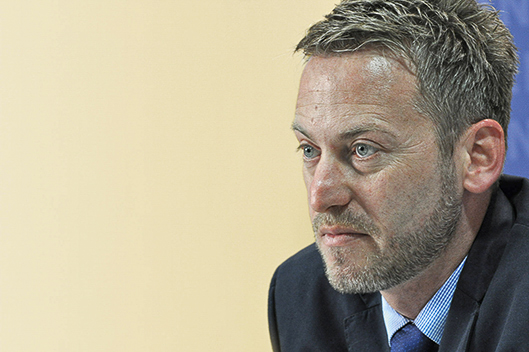
As a member of the ad hoc Voting Commission of deputies nominated to oversee the voting process, Ilir Deda was the only opposition deputy left in the chamber when Thaçi was elected president, with the remainder either suspended from the session or boycotting it. Photo: Atdhe Mulla / K2.0.
Thaçi’s appointment proved divisive not only between government and opposition, but also within the ruling Democratic Party of Kosovo (PDK) – Democratic League of Kosovo (LDK) coalition; a handful of LDK deputies refused to vote for him, despite support for his candidacy having been foreseen since the end of 2014. In December that year, LDK had caused consternation amongst a wide part of the population, including many of its own supporters and members, by backing out of a post-election pact with other parties that had been intended to keep PDK away from power after it had headed the government since 2007, with Thaçi at the helm.
LDK and PDK signed a controversial governing agreement, which stated that the former’s leader, Isa Mustafa, would receive the prime ministerial role, in return for agreeing to back Thaçi’s nomination for president two years later. It was the second time since independence that the two parties had formed a coalition together, despite allegations that the Secret Informative Agency (SHIK) that served PDK had been involved in the post-war assassination of its LDK opponents.
With the Constitution stating that the president represents the “unity of the people,” the nature of Thaçi’s election showed that the people were anything but unified behind him.
“People should think why even Joe Biden called Thaçi the ‘George Washington of Kosovo.’”
Xhevahire Izmaku, PDK
For Xhevahire Izmaku, a PDK deputy who was elected to the Assembly for the third time in 2017 and who voted in favor of Thaçi, those who oppose him are simply jealous of his “successes.” “Thaçi had been at the head of politics, and certainly being higher than others and the fact that others couldn’t reach his heights have caused them to have such a stance toward the president,” she says.
Indeed, Thaçi, who turns 50 this month, has been at the forefront of Kosovo politics for the past two decades, and has put himself at the center of every major political process. From heading the Kosovo delegation at the Rambouillet Peace Talks at the end of the war in 1999, to reading the Declaration of Independence as prime minister on February 17, 2008 — a role that should have been performed by the president of the Assembly — Thaçi has worked hard to establish a self-styled image as the consummate statesman.
“People should think why even [former U.S. Vice President] Joe Biden called Thaçi the ‘George Washington of Kosovo,’” Izmaku says.
One way or another, six months from the halfway point of his five year mandate, the president has not been able to galvanize a widespread consensus of support. In February, a number of high profile figures refused to receive awards that Thaçi had nominated them for on the occasion of Kosovo’s 10th anniversary of independence, while there are currently loudening calls to dismiss him following a series of major controversies in recent weeks.
Broken friendships
Such aversion to Thaçi being president is no better demonstrated than amongst his former friends, turned political rivals.
Haxhi Shala’s friendship with Thaçi dates back to wartime, but they were subsequently political colleagues within PDK for more than a decade. In 2013, however, he was one of a number of PDK members who were unhappy with Thaçi’s then leadership of the party and who broke away to form NISMA, the party he represents as a deputy in the Kosovo Assembly today.
“I have respect for him as a friend and value his merits during the war ... but when it comes to political developments this man should immediately retire as he has caused a lot of harm to the country.”
Haxhi Shala, NISMA
With NISMA in opposition back in 2016, and the party campaigning against Thaçi’s election as president, Shala deliberately missed the Assembly session in which the vote took place. “I have respect for him as a friend and value his merits during the war,” he says. “We were together throughout the time that I led my brigade and had amicable relations during the war, but when it comes to political developments this man should immediately retire as he has caused a lot of harm to the country.”
Another former friend and colleague of Thaçi’s, Ismajl Kurteshi, took a different approach to his opposition to Thaçi’s election as head of state. “I was so elated that Thaçi was becoming president that I decided to activate a tear gas canister at the Assembly,” Kurteshi recalls with a laugh. He was one of 11 opposition deputies suspended from the session.
Kurteshi had been part of Thaçi’s PDK for five years when it was first formed, serving as mayor of Gjilan in 1999-2000, before being elected as an Assembly deputy in 2001 in the first legislature after the war, part of the the then provisional institutions of Kosovo.
Kurteshi’s relationship with Thaçi soured in 2005 when Thaçi began to support the decentralization process, initiated by the international community ahead of the resolution of Kosovo’s final status as a multiethnic state. Unhappy with the process — which led to the creation of a number of new Serb majority municipalities — and believing that Thaçi had backed it simply to boost his standing with the international community and gain personal credibility, Kurteshi left PDK. Two years later, Thaçi became Kosovo’s prime minister, whereas Kurteshi went on to join Vetëvendosje and was elected as a deputy in 2014.
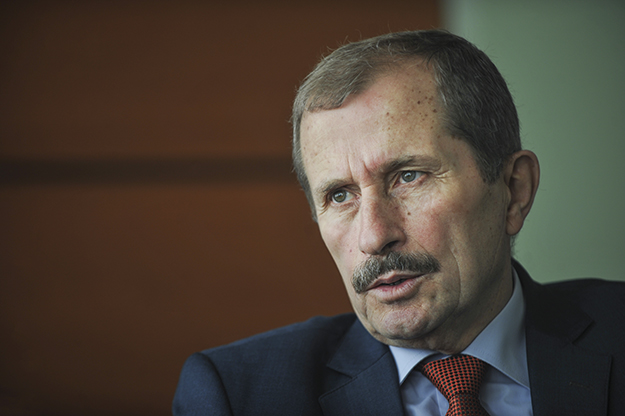
Ismajl Kurteshi served as an Assembly deputy and a mayor in Thaçi’s PDK after the war, but became disillusioned with what he saw as the then party leader’s prioritization of personal gain over the good of Kosovo. Photo: Atdhe Mulla / K2.0.
Today, Kurteshi continues to think that Thaçi sails in the same waters and that he makes deals based not on the good of the country but on how he, and a select few, can personally gain.
“For instance, Isa Mustafa’s LDK backed Thaçi — it wasn’t that they believed that Thaçi would be a good president, but they needed to buy the position of prime minister [during negotiations to form the government coalition in 2014], which was conditioned with voting in favor of Thaçi [for president].”
Longstanding LDK deputy Besa Gaxherri, whose involvement with the party dates back to the ’90s, admits that Thaçi’s election as president wouldn’t have been possible without the backing of her party, but insists that leadership requires difficult comprises to be made. “We ended the six months of political stalemate,” she says, referring to the deadlock following the 2014 elections, when nobody was able to form a government, before going on to accept that the trade off for her party getting the position of prime minister was necessarily ceding the presidential role. “At the end of the day, the function of politics is power, therefore, it is shared between individuals.”
Kurteshi though, insists that democracy was suspended at the moment of the vote, alleging that many of the votes in favor of Thaçi were part of a “bargain” for personal benefit.
“Someone, [in return] for a vote in favor of Thaçi, became ambassador,” he says, referring to former LDK deputy Alma Lama, an outspoken opponent of Thaçi, who nevertheless voted for him as president; critics often point to her appointment as Kosovo’s ambassador to Italy in July 2016 as evidence that her vote “was bought.”
Critics have continuously highlighted a culture of nepotism and clientelism within the top ranks of Kosovo politics, a culture confirmed in 2016 with the release of wiretapped conversations showing leading PDK figures, including Thaçi, dividing out public positions amongst their supporters. This week, Kosovo’s special prosecution filed indictments against 11 political figures involved in the affair, although Thaçi’s name was not amongst them.
‘Only a constitutional category’
LDK was not the only party that committed to vote for Thaçi through the 2014 coalition agreement. Deputies in the 20 Assembly seats reserved for representatives of Kosovo’s minority communities were also part of the deal.
Veton Berisha was a first time deputy when he was elected as part of the Egyptian Liberal Party to represent the interests of the Egyptian community at the Kosovo Assembly, joining LDK’s parliamentary group. Ultimately, Berisha voted in favor of Thaçi, saying that Isa Mustafa and current leader of PDK Kadri Veseli had put pressure on him to sign the coalition partnership in 2014; he believed being part of the government would allow him to help improve the lives of one of the most marginalized communities in Kosovo. “They demanded my vote in favor of Thaçi with the condition of acting for the good of the Egyptian community,” Berisha says.
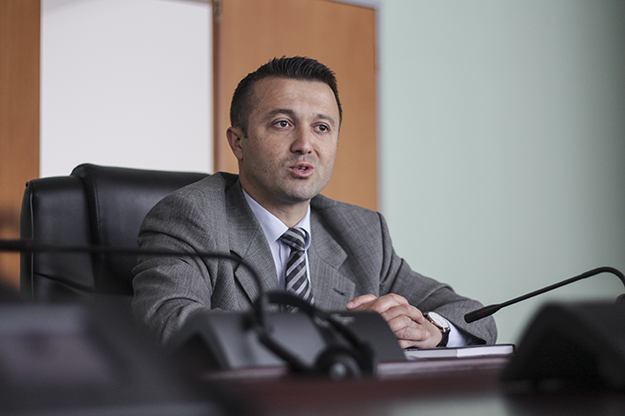
Veton Berisha, an Assembly deputy with the Egyptian Liberal Party, says that Thaçi has made no effort to forge links with the Egyptian community and that the president does not treat his community equally. Photo: Cristina Mari / K2.0.
Despite having voted for him, Berisha does not believe that Thaçi has fulfilled his presidential oath with regard to representing all communities, alleging that he has favored some communities over others. “We made a request for Thaçi to visit our community and have wanted to award him with a certificate since 2016, but he could never find the time to visit us and create a direct relationship with us,” Berisha says.
The motivation to present Thaçi with the certificate was not so much to verify his deeds for the community, but more to try to get him to recognize its existence in Kosovar society. “He knows the Egyptian community only as a constitutional category but doesn’t know our values; we demand nothing more than equal treatment from Thaçi, as he gives to Albanians, Serbs, Bosnians, Turks and other communities in Kosovo.”
For the Egyptian deputy, Thaçi’s behavior has made him appear to be “a disunifying figure” who has not fulfilled his presidential oath to treat everyone impartially regardless of ethnicity. “I have publicly reacted when Thaçi has honored only the Albanian and Serb victims [of the war in Kosovo] while he has never honored … people killed and still missing from the Egyptian community,” he says. “With this, Thaçi wants to say that there were only Albanian and Serb victims, and based on this he doesn’t show that he is a unifying president.”
“I think he is the most unifying person in the country, otherwise he would not have been here."
Xhevahire Izmaku, PDK
However, PDK’s Izmaku contests the idea that Thaçi hasn’t been unifying, asserting that he has fulfilled his constitutional role and supported marginalized groups within Kosovar society.
“I think he is the most unifying person in the country, otherwise he would not have been here. Don’t forget, for the first time a leader of a country participated in support of the LGBT parade in Prishtina, and not all leaders dared to do that,” she says, pointing to the fact that Thaçi has twice participated in prominent LGBTI events, whereas other political leaders have been conspicuous in their absence. Critics suggest that Thaçi has been a reluctant participant, who has shown his face not because he believes in the values, but because of the presence of the international community.
Politicking and maneuvering
In his two years to date as president, Thaçi’s name has rarely been away from the center of domestic and international debate, particularly on the biggest of issues.
As supreme commander of the Kosovo Security Force (KSF), Thaçi undertook an initiative in March 2017 to transform the KSF into a regular army through a special law. In doing so, he was attempting to bypass carrying out the transformation through making constitutional changes, which would require the backing of two-thirds of Serb deputies in the Assembly; all 10 parliamentary seats reserved for the Serb community are held by the Belgrade-backed Lista Srpska, which is vehemently opposed to a Kosovo army.
His move was quickly followed by a backlash from the international community, which supports transformation only through constitutional amendments. In a statement, the U.S Embassy wrote: “Adoption of the current proposed law would force us to re-evaluate our bilateral cooperation with and longstanding assistance to Kosovo’s security forces.”
Thaçi quietly retracted his proposal, but he continues to state that patience on the issue will come to an end sooner or later.
For PDK’s Izmaku, Thaçi’s efforts with regards establishing the army are not over, and she insists that the opposition simply has an agenda against Thaçi. “I know that in his first mandate he will be the supreme commander of the Kosovo Army,” she says, before referencing a similar claim made by Thaçi during Independence Day celebrations. “I believe in him, and I have heard him in the KSF parade for the 10th anniversary of independence.”
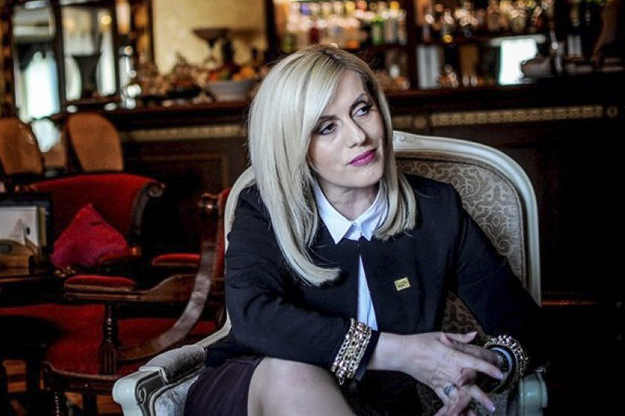
PDK deputy Xhevahire Izmaku believes that critics of Thaçi are simply jealous of him and says she has faith that the president will deliver on his promises. Photo: Kushtrim Ternava.
Even when he is not publicly involved in issues and initiatives, the extent of his mixture of hard and soft power from almost two decades at the top of Kosovar politics, and the level of mistrust in him from his critics, is such that they suspect his fingerprints on any major controversy.
As a turbulent 2017 — which had been characterized by political stagnation and two sets of elections — was coming to an end, Kosovars would have been forgiven for thinking that they finally had some peaceful days ahead. However the false promise was crudely interrupted on December 22, when, out of the blue, 43 deputies submitted a petition to the Kosovo Assembly attempting to abolish the Specialist Chambers. The Chambers had been established to try war crimes and crimes against humanity committed during and in the immediate aftermath of the war in Kosovo.
Thaçi — who is a potential indictee at the Specialist Chambers after he was named in the Council of Europe report that was fundamental in their establishment — was accused by critics of having been the mastermind of the initiative to abolish them, by exhibiting his influence on PDK deputies. A couple of months earlier, the president had appeared to change his stance on the issue 180 degrees, lashing out at the Chambers as “completely unjust”; in 2015, as foreign minister and leader of PDK, he had been instrumental in ensuring that changes to the law and Constitution necessary for the establishment of the Chambers passed through the Assembly.
The 2017 initiative to abolish the chambers never made it to a vote, with many deputies skeptical about the motives behind the petition, which was filed late on a Friday night just before Christmas. “I did not sign the initiative to abolish the Specialist Chamber as I voted to form [them] with the reasons I provided,” Berisha says.
“He intends to withdraw with clean hands, but citizens have seen his maneuvers.”
Ismajl Kurteshi, Vetëvendosje
There was also a swift and particularly direct reaction from the U.S. Ambassador, who said that it would be considered a “stab in the back” if it passed, while the U.K. Ambassador said that repealing the law would be a “betrayal.” Meanwhile, the official reaction from the Quint embassies (those of the U.S., U.K., Germany, France and Italy) appeared to indirectly reference a claim that had been made by Thaçi in the preceding days that the international community had promised visa liberalization in exchange for establishing the Specialist Chambers, explicitly stating that there was “no deal done.”
“What has characterized Thaçi in these two years is leaving initiatives halfway,” says Vetëvendosje’s Kurteshi. “He introduced the transformation of the Kosovo Army with unseen enthusiasm and then withdrew, as he did with the initiative to abolish the Special Court and then he withdrew again,” he says. “What is interesting is that he intends to withdraw with clean hands, but citizens have seen his maneuvers.”
NISMA’s Shala similarly believes that Thaçi is constantly masterminding such political maneuvers in order to show that he is the person that can resolve them. “He is a person that creates crises in order to maintain [his role] in the political scene and to look like a partner of the international community,” he says.
Speaking of the effort to abolish the Specialist Chambers, Izmaku insists that Thaçi ensured that there was a “happy ending” before any real damage was done, and criticizes the opposition for being irrationally critical toward him, suggesting there are historical grudges at play. “The reason that the opposition is reluctant [to embrace Thaçi] is that some of them didn’t even believe in independence and they have been permanently skeptical,” she says.
Suspicion and mistrust
Criticism and suspicion toward Thaçi has reached fever pitch in recent days, following inconsistencies in his reaction to the March 29 deportation of six Turkish citizens — five teachers and a doctor — to Turkey in murky circumstances.
Information surrounding the deportations was sporadic in the hours and days that followed, with the Interior Ministry stating that they had been carried out due to “national security” concerns, but leading members of the government apparently unaware in advance. In addition, grave concerns have been raised by human rights campaigners, who say that the process violated international human rights conventions. Earlier this week, the Assembly of Kosovo held an extraordinary session and overwhelmingly passed a recommendation for an inquiry to conduct an investigation into the case to shed light on those responsible for the deportations.
Many people, however, appear to have already made up their minds. Those pointing the finger at Thaçi note his shifting response to the incident, and the fact that he appears out of tune with leading members of the government on the issue.
On the evening of the deportations, amongst significant public outcry, Thaçi told the Jeta në Kosovë TV show that he had not been aware of the action taking place and that he felt sorrow for the way the deportations happened. Two days later, he appeared to change tack, telling a press conference that the six Turkish citizens posed a threat to Kosovo’s national security. Meanwhile, Prime Minister Ramush Haradinaj, who also said he was unaware of the action taking place, reacted by asking for the resignation of the interior minister and attempting to dismiss the head of the Kosovo Intelligence Agency, a move that is currently being blocked by Thaçi.
For Ilir Deda, now a deputy with opposition party Alternativa, the reaction of Turkey’s increasingly authoritarian president Recep Tayyip Erdoğan, who praised Kosovo’s president for his stance, is significant and explains who was behind the action. “Mr. Thaçi has part of the Kosovo Police in his control, partly in the Kosovar Intelligence and Special Forces. Part of state security is not responding to other institutions but directly to the president, which is highly unconstitutional and reveals the threat of Thaçi being in the position of president,” he says.
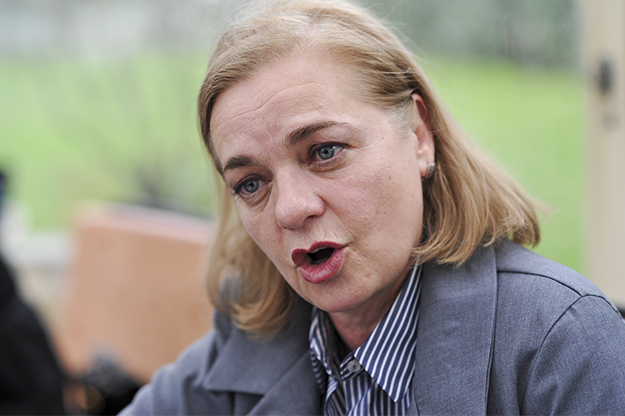
Looking back, longstanding LDK deputy Besa Gaxherri has regrets over her party’s role in Thaçi’s election as president and says that they are now trying to find a way to dismiss him. Photo: Atdhe Mulla / K2.0.
LDK’s Gaxherri is also convinced that the president was somehow involved. “We all know … that Thaçi is behind the event. The problem is that the snake has no legs, and he left no footprints,” Gaxherri says, referencing the president’s wartime nickname.
For Gaxherri, suspicions over the deportations are the final nail in the coffin for Thaçi, and she wishes she could turn back time, saying that if she could she would make more effort to stop the 2014 coalition agreement that enabled him to become president. “I am really sorry that we [LDK] have been part of it and gave the opportunity to Thaçi to become president and to harm the country so much,” she says, before emphasizing that LDK’s position has now clearly changed. “In this respect, we are working to find the legal space to dismiss him.”
Izmaku, who is part of the Assembly Committee that oversees the Kosovar Intelligence Agency, is not surprised by the accusations against Thaçi and points out that no evidence has been brought forward that he had any involvement in the deportation of the Turkish citizens. “I don’t like to comment on things that are just assumptions, but as a deputy I am still not informed of the details of the action of deportation,” she says.
International pariah?
Thaçi’s move to become head of state in 2016 may have seemed a natural one for a man that has been involved at the center of Kosovo politics since the war, not least because he is often considered to enjoy a close relationship with the international community, which has been heavily involved in the state-building process. As with everything to do with Thaçi, however, nothing appears to be that simple.
For Deda, Thaçi has been “inexistent” in international affairs in the past two years and has failed to develop a profile on the international scene. “Thaçi does not exist outside of Kosovo,” he says. “He exists in Brussels and multilateral meetings where the six Western Balkans states are.”
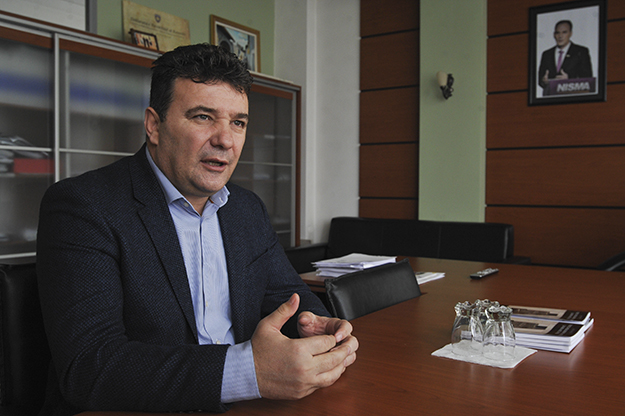
NISMA deputy Haxhi Shala says that Thaçi has had a limited presence internationally since becoming president, suggesting his image has been tarnished by allegations linking him to war crimes. Photo: Atdhe Mulla / K2.0.
Shala agrees, arguing that Thaçi’s predecessor Atifete Jahjaga made much more of an impression on the international scene, despite having had no political experience before taking on the role. While she received criticism for not playing a stronger role in helping to resolve domestic political disputes, Jahjaga earned respect internationally, particularly for raising her voice on issues such as war victims, missing people and survivors of sexual violence.
“Before Thaçi, we had President Jahjaga, who as president visited many conferences,” Shala says. “Her representation was really valued for the issues she raised.”
Both Deda and Shala believe that Thaçi has struggled to make an impression on the international scene due to his name featuring centrally in the 2011 Council of Europe’s ‘Dick Marty’ report that alleged grave war crimes and crimes against humanity. “He is a person who has been damaged in the eyes of internationals,” Shala says. “Perhaps the Dick Marty report has tarnished the image of Thaçi and for this reason he has found it difficult to be present in the international arena.”
However, Thaçi has not stayed completely silent when it comes to the effort to change his face internationally. Last year, he announced that he would be forming a Truth and Reconciliation Commission to help discover the truth about Kosovo’s wartime past; although announced with much fanfare, few visible steps have been taken by the president in this regard since.
“I do not think he will manage to finish his mandate as president."
Ilir Deda, Alternativa
In an attempt to improve his personal reputation, Thaçi has been doing the international rounds in London, Paris and New York in recent weeks, promoting a biography of him by two British journalists, Roger Boyes and Suzy Jagger, titled, “New State, Modern Statesman — Hashim Thaçi, a Biography.” In a review of the book (which is still not on general sale in Kosovo) for Koha Ditore, columnist Agron Demi reveals that the authors use “acrobatic language” to compare Thaçi’s political life with some of the most influential figures of the 20th century, including Winston Churchill, Charles De Gaulle, Nelson Mandela and Richard Nixon.
It’s clear that Thaçi views himself in the same vein. He has long been a leading figure in the Brussels dialogue between Kosovo and Serbia that started in 2011 when he was prime minister. Two years later, he was still prime minister when a “landmark” agreement was signed between the two states in 2013.
It has long been circulated that “the next phase of the dialogue” will shift to the presidential level, which would of course mean Thaçi leading the way — a role he has shown willingness to undertake. “It is no secret that he likes the talks with Serbia and he likes to be the protagonist,” Shala says. “He started them and he is willing to finish them.”
However Deda is sceptical that Thaçi will manage to conclude the dialogue, suggesting that the controversy over the deportations of the six Turkish citizens will prove to be his downfall. “I do not think he will manage to finish his mandate as president after the gross violation of the Constitution of Kosovo, where Thaçi does not hide that he has taken part in the usurpation of the institutions — something the president of Turkey had admitted,” he says.
Thaçi’s first two years as president of Kosovo have created controversies and notable dissatisfaction, polarization and polemics across the country’s political spectrum. But one thing is clear — Thaçi has spent two decades consolidating his grip on power and has no intention of giving it up easily.K
K2.0 contacted the President’s Office for a response to all of the claims made about Thaçi in this article, but received no response.
Feature image: Atdhe Mulla / K2.0.
Edited by Jack Butcher and Besa Luci.







